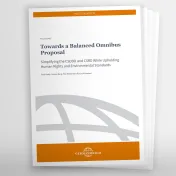
The German "Supply Chain Due Diligence Act" is adopted! But what exactly is behind this? Our analysis shows: We are still a long way from reaching our goal in the fight against human rights violations and environmental degradation in global value chains, but with the new law, we are finally off to a good start.
The new Supply Chain Act will enter into force in 2023 and will initially apply to companies with 3,000 or more employees, then from 2024 to companies with 1,000 or more employees with a registered office or branch in Germany. The law obliges these companies to fulfil their due diligence obligations in their supply chains with regard to respecting internationally recognized human rights and certain environmental standards.
The law refers to the UN Guiding Principles on Business and Human Rights which are among the most important internationally recognized standards of corporate responsibility for human rights. In line with the UN Guiding Principles, the Supply Chain Act aims at strengthening the rights of people along global supply chains vis-à-vis companies.
The law is a response to the devastating incidents in which German companies have been directly or indirectly involved in their international business activities in recent years. Recurring reports about burning or collapsed factories, exploitative child labour or destroyed rainforests have shown: Voluntarily, many companies do not sufficiently fulfil their responsibility in global supply chains. Studies by the European Commission and most recently by the German Government have confirmed this.
Against this background, the Initiative Lieferkettengesetz was founded in September 2019 as a broad civil society alliance and has since demanded that the German Government passes a supply chain act before the end of this legislative period in September 2021. This law would have to pursue two goals:
- Companies avoid damage to people and the environment by taking precautionary measures.
- Affected parties can more easily obtain redress when damage has occurred.
The German Supply Chain Act passed on June 11 is a political compromise. As such, it includes a number of points that have the potential to contribute to greater human rights and environmental due diligence by companies in their value chains. At the same time, the compromise falls significantly short on many aspects, which means that the law is not effective enough and cannot just serve as a model for a European supply chain law. We shall address these points in detail in the sections "Finally at the start" and "Not there yet". [...]
- Please check full analysis in the download section -
Unofficial translation; original version in German



